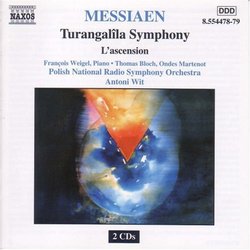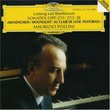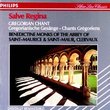Modern French Music
Brett A. Kniess | Madison, WI | 01/27/2006
(5 out of 5 stars)
"Olivier Messiaen, the great French modern composer, is here represented by two of his most famous compositions: the early four meditations on L'Ascension and, a composition written after he was released from a German prison camp, the Turangalila-Symphonie, a work of monumental proportions.
L'Ascension is a 25-minute work also well known as an organ solo. Each of the four meditations has specific scripture attached to it, representing Christ's ascension. The first, written for brass ensemble, is a slow undulating progression of chords, which continually resolve themselves gloriously. The second opens with woodwinds alone, a chanting oboe (heavy on tritones), with added outbursts of nature on flute and clarinet. The huge lush string tremolos which end the piece, makes it truly French sounding. The third meditation is a scherzo with brash trumpets and full orchestra. Swift string glissandi, a heroic horn melody and calls are features of this outgoing section, all of which ends in a blaze of glory. The final meditation is marked "extremely slow and solemn" and is written for string ensemble only. Prayerful in nature, like the first, it is made up of a succession of undulating, and more importantly, rising progressions of chords. It is obvious Messiaen studied with the great Romantic/Impressionist teacher Paul Dukas, because the various orchestrations are quite vivid and colorful, amply depicting the prayers of the ascension. An interesting work from his youth.
The massive 80-minute Turangalila-Symphonie is a ten-movement work which features solo piano and a solo ondes martenos, an electronic contraption that makes an unearthly, ghost kind of sound. The title is from Sanskrit which means many things, including time, joy, love, life, and death. The opening movement introduces two important themes: the gigantic, heavy brass chords (called the statue theme) evoking ancient Mexico; and the delicate "flower theme". Together with a large battery of percussion, the movement is forceful and animated. The second movement has an almost jazzy groove which leads into the sumptuous "love theme" in the strings and ondes martenos. An other-worldly, menacing march with weird string tremolos, ondes martenos glissandos, and col legno strings enter, as well as a rhythmical, almost a Copland-ish dance-like section, gives the movement great variety. The third movement displays four themes alone and then puts them together to form utter chaos; while the fourth movement begins as an industrious scherzo, but gives way to a romantic sweeping melody and an almost jazzy secondary melody which dominates the movement. The middle movement has such a joyful and nearly humorous melody, you can't help but smile. The addition of constant tinkly bells and piano, and the confusion of the middle section, it is all a breathless account. Whereas the fifth movement is a dance of love, the sixth movement is more a love slumber, with lazy harmonic development, pulsating vibraphone, lush strings, and woodwind meanderings, all sounds subside in a peaceful sleep. Movement seven opens with a piano cadenza, and later features percussion alone, and a woodwind ensemble with solo cello. Messiaen takes some great themes from earlier movements and develops them in the eighth movement. There are some very dramatic and satisfying arrivals here; a climactic movement. The penultimate movement is a simple natural crescendo, achieved through adding instruments to increase volume. The glorious final movement has a Copland-like perpetual motion with a syncopated melody that is rather engaging. A short love theme, nearly cinematic, invades, and a huge major chord ends the work. The music has advanced harmonies, but they are all based in the tonal world, and Messiaen uses dissonance freely to accent the innate tonal world he writes in. He is especially gifted at writing great melodies and themes which are inventive and engaging, as well as infusing jazz-like rhythms and perpetual motion into the underlying score.
Do not be afraid of this CD because it is a budget label, it is by and far a first-class recording. This may be the finest recorded version on disk (in my opinion). The playing is cohesive, and the forces are closely miked so all voices speak exceedingly clear. The ondes martenos is heard every time it needs to be; the piano soloist is excellent; and while this is the first time I have heard Antoni Wit and the Polish National Radio Symphony Orchestra, their cohesiveness, commitment, and emotional depth are in high gear. Wit's pacing of the work is the stand-out quality, forward movement and prominent textures, melodies, and secondary effects all are heard in a musical manner. The ensemble gives this modern work such emotion and make it fun for the listener; an experience if nothing else. One fair warning, the music of Messiaen is not for everyone; listen to the examples first! Even at budget price, this 2-CD extravaganza outranks many overly-hyped full-price CD's; an enthusiastic recommendation."
Messiaen's Most Magnificent Work - The Turangalila Symphony
Shota Hanai | Torrance, CA | 05/27/2005
(5 out of 5 stars)
"I first heard the name Olivier Messiaen when I listened to "Illuminations of the Beyond". I burrowed the CD from a local public library. It was a beautiful atmospheric piece. Very modern and complex, yet so innocent and full of mysticism (except for couple tense moments). I really felt as if I was launched from Earth into the Heavens or a strange new extraterrestiral world...
After telling to one of my music friends about this new mysterious composer and his piece, he recommended me to listen to the well-known Turangalila Symphony. As a person who loves contemporary Classical music and has to will to be exposed to many more, I quickly did. I bought this album at a budget price, the first Naxos album I obtained.
The piece turned out to be a work I would embrace forever. Once again I felt as if I was launched into some strange world. This massive 80-minute so-called Symphony (not a "symphony" in traditional means) truly seduced me; its modern sound (including the Ondes Martenot - I first heard that name in the music from movie "The Black Cauldron" by Elmer Bernstein) and exotic features, its mysticism in ideas, and especially its theme on love/erotica inspired from Tristan and Isolde. No other music seemed to describe more than this work of my hunger for both physical and emotional love, not even the more obvious music ranging from Rachmaninoff to modern pop love songs (and some are even lame or just plain "dirty").
My favorite movements includes "Song of Love I", the scherzo-like "Joy in the Blood of the Stars", and the beautiful "Garden of Sleep".
Ever since, Messiaen has become on the composers I embrace. He is one of my favorite 20th century composers because of his distinct, subliminal style. Even atonal features (which I'm not too fond of) seems so beautiful. The Turangalila Symphony is definitely one of my desert island pieces so I can always take myself into a cosmic ride listening to this work. And I wish my future significant other would appreciate the type of love I feel the most through this music.
The album also features "The Ascension". Originally scored for solo organ, separately available elsewhere, this work describes Christ's ascent into the Heavens. The first movement is particularily moving, played by the warm sound of brass, as it seems to rise toward heaven just like Christ the Lord. Great work for a symphonic wind ensemble.
Kudos to Antoni Wit, and the Polish National Radio Symphony Orchestra (with Francois Weigel on piano and Thomas Bloch on Ondes Martenot) for a marvelous performance. I have heard couple other performances including Chung's, Nagano's and Salonen's, each with relative ups and downs, but overall, this recording is still my favorite.
If you're completely new to Messiaen, the Turangalila Symphony is an excellent start to enter his mysterious world of music. At a budget price, this is a bargain."
A chance to explore some seriously R-rated music
R. Gregory Capaldini | Arlington, VA United States | 03/15/2006
(5 out of 5 stars)
"There are some great recordings of Messiaen's "Turangalila" and while this isn't the only good one at budget price (Ozawa with the Toronto Symphony is now available as an RCA re-release), it has the added attraction of including "L'Ascension." The latter four-movement suite is perhaps the composer's most accessible orchestral score, also serving as a helpful introduction to his unique Christian music. I particularly like the ever-upward-reaching strings of the slow, serene finale entitled "Christ ascending to His Father." Again addressing the Turangalila, I can smile at the reaction of the young reviewer who spoke of "cat scratches" because at one point, I too found Messiaen's music to be a bit much. Now in my mid-40s, I doubt I'll ever lose my deep affection for it, particularly those ecstatic passages that express erotic delirium -- something a pre-adult listener wouldn't (and shouldn't) understand just yet. Curious listeners should go ahead and make the modest investment that Naxos, to its credit, has again made possible."


 Track Listings (7) - Disc #1
Track Listings (7) - Disc #1


